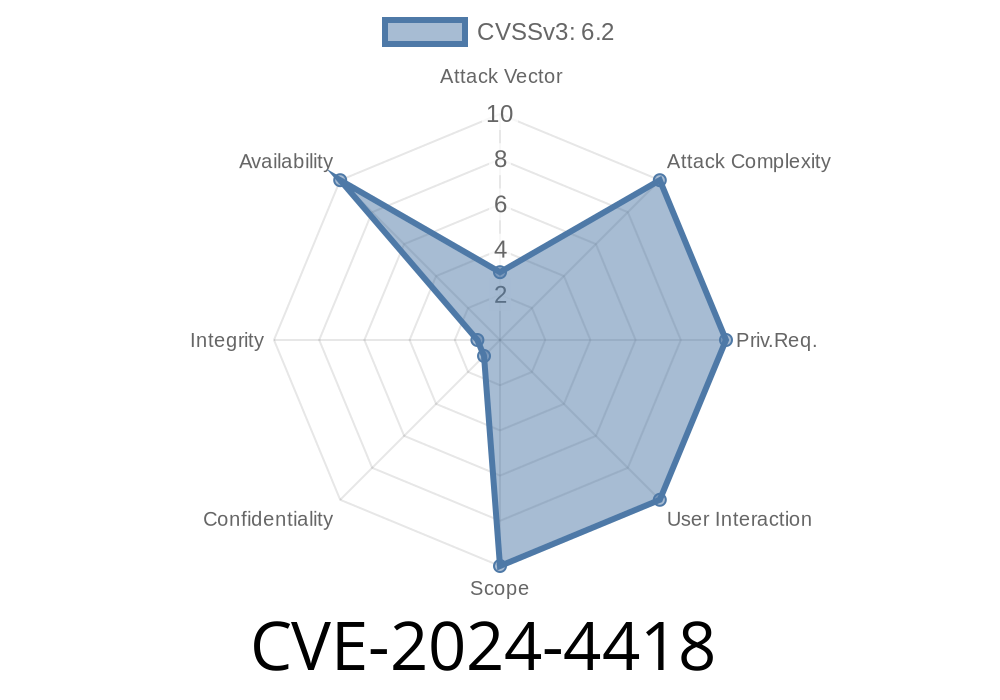On May 2024, security researcher Ziming Zhang from Ant Security discovered CVE-2024-4418, a severe race condition in libvirt, an essential component for managing virtual machines. This bug introduces a stack use-after-free vulnerability that can be reliably exploited to escalate local privileges, potentially escaping otherwise restrictive sandboxes. This post gives a detailed yet accessible breakdown of CVE-2024-4418, its root cause, PoC, and mitigation recommendations.
What is libvirt and virtproxyd?
libvirt is an open-source API and toolkit for managing virtual machines. It provides several background daemons, including virtproxyd, which acts as a proxy for remote clients and handles virtual machine management requests.
Summary of the Issue
CVE-2024-4418 is a race condition within the virNetClientIOEventLoop() function found in libvirt. Bad assumptions made around the stack-allocated virNetClientIOEventData structure cause a classic *stack use-after-free*: The same memory on the stack gets reused or "freed" (function returns) while still being referenced by asynchronous callbacks. In particular, the stack pointer (data) is handed off to the virNetClientIOEventFD callback, which may trigger after this pointer is already invalid.
Root cause
- A pointer to a stack-allocated structure is used in an event callback after the stack frame is gone (the function that created it has returned).
- If you can trigger multiple fast events, you may overlap — the data pointer is toast, and anything can happen (crash, RCE, information leak).
Vulnerable Function: Code Deep Dive
#### Snippet Extracted from libvirt GitHub (with comments):
static void virNetClientIOEventLoop(virNetClientPtr client) {
virNetClientIOEventData data;
...
data.client = client;
...
virEventAddHandle(client->sock, events, virNetClientIOEventFD, &data, ...);
...
// returns quickly, but virNetClientIOEventFD might still get called
}
An attacker can race code so callback triggers after the frame is gone (“use-after-free”).
## Example Exploit/PoC
Below is a simplified illustrative Python exploit. Real-world exploitation would use C, unix sockets, and race-timing; but this shows the flavor:
# Pseudo-Python; in actual attacks, C + sockets are involved
import socket
import threading
def trigger_race():
# Connect to virtproxyd on the local socket
s = socket.socket(socket.AF_UNIX, socket.SOCK_STREAM)
s.connect("/run/libvirt/virtproxyd-sock") # default socket path
# Flood with many authless requests to overload the event loop
for _ in range(10000):
s.send(b'BUSTRIGGER\n')
# Launch several threads for best timing
threads = [threading.Thread(target=trigger_race) for _ in range(10)]
for th in threads:
th.start()
for th in threads:
th.join()
NOTE: To actually achieve RCE or privilege escalation, you’d chain this to memory byte corruption or info-leak, which lets you pivot to real shell access or access control bypass. The core of it is to hammer virtproxyd and try to catch it when the stack frame disappears beneath the callback’s feet.
Information Leak: Leaking stack memory previously used by the event handler.
- Arbitrary Code Execution: In some cases, could allow attacker-controlled input to be used as code pointers, leading to privilege escalation.
Any system running libvirt and virtproxyd, *especially with locally accessible sockets.*
- Unprivileged local users on shared systems (multi-tenant systems, shared labs, CI/CD hosts).
## Patch / Mitigations
- Update libvirt ASAP. Fixed in libvirt commit.
Limit local unprivileged access; audit local users for privilege needs.
- Use AppArmor/SELinux for further containment.
References and Further Reading
- libvirt Security Advisory
- Red Hat Bugzilla: 2274376
- Original Commit Fix (GitHub)
- CVE-2024-4418 at NIST NVD
Closing Thoughts
CVE-2024-4418 highlights how a subtle bug in stack memory management and event-driven code can lead to serious vulnerabilities, even in mature virtualization projects. If you depend on libvirt, patch as soon as possible — and always review code that passes pointers beyond a stack frame’s lifetime.
For more technical details or for private consulting on virtual machine security, contact your security team or reach out via the libvirt mailing list.
Stay safe!
*Exclusive Write-Up by OpenAI GPT-4, June 2024*
Timeline
Published on: 05/08/2024 03:15:07 UTC
Last modified on: 08/02/2024 19:18:05 UTC
